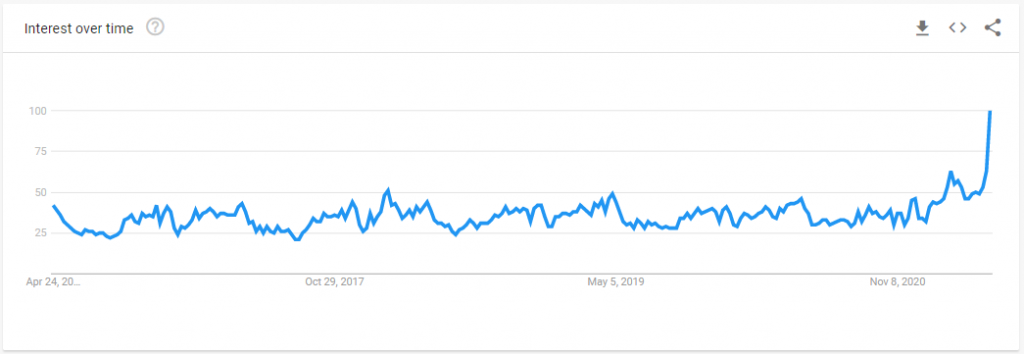Is Your Portfolio Protected Against Inflation?
Inflation is picking up, and people are taking notice. Google Trends, which measures the frequency of internet searches over time, proves that individuals are increasingly concerned about inflation – and they should be. Inflation is, generally, the most significant risk for retirees. One could even argue that the primary motivation for investing is to grow your wealth over and above the rate of inflation.

Like all hazards in investing, the risk of inflation is always present, even when that risk doesn’t materialize. And because of the always-lurking threat imposed by inflation, Truepoint portfolios are explicitly built with inflation in mind.
We’ve done the homework, searching for the best inflation hedge across nearly every investable asset class. Here’s what our research shows: It’s not gold, commodities like oil or steel, or TIPS, which only protect against unexpected inflation (consensus expectations factor into the price of TIPS.) We believe the #1 unquestioned hedge for inflation over the long-term is…
Stocks. Specifically, a globally diversified portfolio of stocks.
Since 1926 the S&P 500 has appreciated by an average of 10.2% per year while inflation has advanced 2.9% per year1. The reason for this is simple – historically, companies have been able to grow earnings and pay dividends at a rate faster than inflation. Large public companies are nimble and have enough pricing power to pass along most of the cost of inflation to consumers2. This dynamic is not ideal for consumers, but it’s great for companies and savers who have accumulated ownership through stock purchases.
But what about the short-term risk of inflation? We know that stocks can get dinged in the short run as inflationary pressures rise (it may explain the market’s activity since May’s inflation report). We saw this in the 1970s when the highest inflationary period over the last 50 years coincided with some of the lowest stock market returns. One of the best short-term hedges to inflation is…
Short-term bonds.
“Tall Paul” Volcker, Fed Chair who crushed inflation and set the stage for two decades of economic growth, taught us that the most effective tool against inflation is stricter monetary policy. His actions brought inflation from a high of nearly 15% to under 4% in less than three years. If we do get a sustained period of inflation, the Fed is likely to use the Volcker playbook, raising interest rates to rein it in. When rates rise, long-term bonds get crushed. Short-term bonds quickly mature, and we have new cash to deploy into our choice of 1) more bonds yielding the new, higher interest rates or 2) stocks if the rise in inflation and interest rates has caused a temporary decline in stock prices.
So, how short are the bonds in the Truepoint portfolio? At 2.9 years, it’s less than half of the Total Bond Market duration of 6.6 years. Translation: regardless of how much inflation we see, how long it persists, or how stocks react, the Truepoint portfolio is well-positioned to take advantage of the opportunities that arise.
1http://www.econ.yale.edu/~shiller/data.htm
2 The decade with the highest earnings growth for S&P 500 companies is, surprisingly enough, the 1970s. Inflation was suffocating the economy and the stock market was not exactly thriving, but companies were able to pass along higher costs and post record profits. http://pages.stern.nyu.edu/~adamodar/New_Home_Page/datafile/spearn.htm




